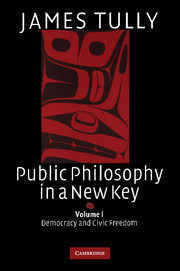Book contents
- Frontmatter
- Contents
- Acknowledgments
- Credits
- INTRODUCTION
- PART 1 APPROACHING PRACTICE
- PART 2 DEMOCRACY AND RECOGNITION
- 4 The agonistic freedom of citizens
- 5 Reimagining belonging in diverse societies
- 6 Multinational democracies: an introductory sketch
- PART 3 INDIGENOUS PEOPLES
- CONCLUSION
- Bibliography
- Index to Volume I
- IDEAS IN CONTEXT
6 - Multinational democracies: an introductory sketch
Published online by Cambridge University Press: 05 September 2012
- Frontmatter
- Contents
- Acknowledgments
- Credits
- INTRODUCTION
- PART 1 APPROACHING PRACTICE
- PART 2 DEMOCRACY AND RECOGNITION
- 4 The agonistic freedom of citizens
- 5 Reimagining belonging in diverse societies
- 6 Multinational democracies: an introductory sketch
- PART 3 INDIGENOUS PEOPLES
- CONCLUSION
- Bibliography
- Index to Volume I
- IDEAS IN CONTEXT
Summary
INTRODUCTION
This chapter is an attempt to apply and refine the approach introduced in Chapters 4 and 5 through the empirical and conceptual study of a particular type of contemporary constitutional democracy – multinational democracies. Multinational democracies are contemporary societies composed not only of many cultures (multicultural) but also of two or more nations (multinational). The Canadian Research Group on Multinational Societies brought together a team of experts from Europe and North America to clarify the complex physiognomy of multinational democracies by reflecting on four leading exemplars – Canada, the United Kingdom, Belgium and Spain – from the perspectives of history, comparative politics and political philosophy. The volume we published in 2001, Multinational Democracies, strives to offer a new approach and contribution to the study, understanding and governing of multinational societies and, in so doing, of culturally diverse societies more generally. This chapter was first published as the introduction to the volume. It represents what I learned from collaboration with this remarkable team. The chapter brings together three components: the democratic activities of struggles over a particular type of recognition (multinational); the responsiveness of a constitutional court to these democratic activities; and the understanding of constitutional law that is required to coordinate democratic freedom and constitutionalism in such cases.
The research team worked together to cast a new light on multinational societies by employing four methodological rules. Since multinational democracies are just coming into being in the present era, it is not possible to present a definitive or comprehensive account.
- Type
- Chapter
- Information
- Public Philosophy in a New Key , pp. 185 - 220Publisher: Cambridge University PressPrint publication year: 2008
- 1
- Cited by

